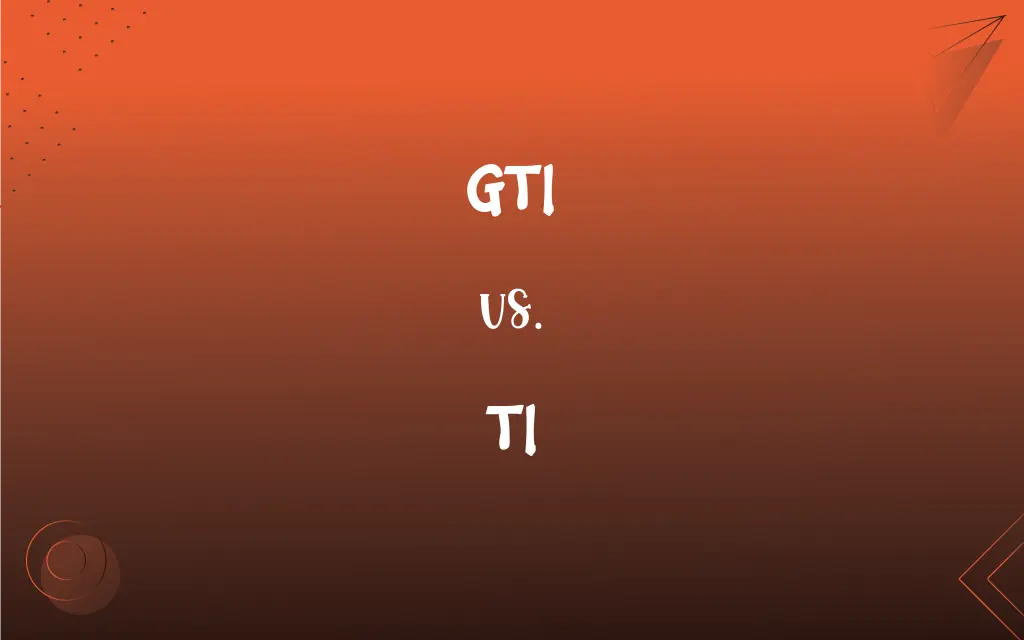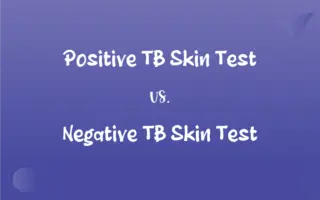GTI vs. TI: What's the Difference?
Edited by Aimie Carlson || By Harlon Moss || Published on February 12, 2024
GTI usually refers to a "Grammatical Tense Indicator," while TI often stands for "Tense Indicator," a simpler form focusing only on verb tenses.

Key Differences
GTI (Grammatical Tense Indicator) is a comprehensive term in linguistics that includes aspects like time, aspect, mood, and voice in verbs. TI (Tense Indicator), on the other hand, specifically refers to the indication of time, such as past, present, or future, in a verb's form.
GTI covers a broader linguistic function, integrating various features of a verb's use and formation, including tense, aspect, and sometimes even voice and mood. TI, in contrast, is solely concerned with the time aspect of a verb, indicating when an action occurs.
GTI is a more complex term, used in detailed grammatical analysis and teaching advanced aspects of language. TI, being simpler, is often used in basic grammar teaching to help learners understand the concept of time in verb forms.
When learning a language, GTI aids in understanding comprehensive verb forms like perfect, continuous, or passive forms. TI, however, helps beginners grasp basic time concepts like past (I walked), present (I walk), and future (I will walk).
In linguistic studies, GTI is crucial for analyzing the complete grammatical structure of verbs in any language, while TI is useful for studying the chronological aspect of actions within language.
ADVERTISEMENT
Comparison Chart
Scope
Covers tense, aspect, mood, and voice
Focuses solely on tense
Complexity
More complex
Simpler
Usage in Language Learning
Used for advanced verb forms
Used for basic time concepts
Example
Perfect tense (I have eaten), Continuous (I am eating)
Simple tenses (I ate, I eat, I will eat)
Role in Linguistics
Comprehensive verb analysis
Chronological action analysis
ADVERTISEMENT
GTI and TI Definitions
GTI
Integral in advanced grammar teaching.
Learning GTI is essential for understanding complex verb forms.
TI
Helps beginners in language acquisition.
Children learn TI to differentiate between eat and ate.
GTI
A linguistic tool for verb conjugation analysis.
The GTI helps identify the passive voice in The book was read.
TI
Essential for learning simple verb tenses.
Understanding TI is key to using will for future actions.
GTI
Used in linguistic research for comprehensive verb study.
Researchers use GTI to categorize verb forms in different languages.
TI
Simple grammatical concept focusing on time.
The TI in She sings shows present tense.
GTI
Helps in distinguishing between similar verb forms.
GTI differentiates between I eat and I am eating.
TI
Tense Indicator, a basic element in grammar indicating verb time.
The TI in I walked indicates past tense.
GTI
Grammatical Tense Indicator, indicating time, aspect, mood, and voice in verbs.
The GTI in I have been running shows a present perfect continuous tense.
TI
Foundational in constructing basic sentences.
TI is used to form correct sentences like He will go.
FAQs
What is the main function of a TI?
The main function of a TI is to indicate the time aspect of a verb, such as past, present, or future.
What does GTI stand for in grammar?
GTI stands for Grammatical Tense Indicator, encompassing time, aspect, mood, and voice in verbs.
Can GTI be used for all languages?
Yes, GTI can be applied to study verb forms in any language.
How does GTI differ from TI in complexity?
GTI is more complex, integrating multiple aspects of verb usage, while TI is simpler, focusing only on tense.
Is TI important for basic language learning?
Yes, TI is fundamental in teaching basic verb tenses to language learners.
Should beginners focus on GTI or TI?
Beginners should start with TI for basic tense understanding before moving to GTI.
Can GTI help in translating languages?
Yes, understanding GTI aids in accurately translating complex verb forms.
Does TI deal with verb conjugation?
TI deals with basic verb conjugation related to tense.
How does TI assist in early childhood language education?
TI helps children grasp the basic concept of time in verbs, aiding in language development.
How do GTI and TI differ in language analysis?
GTI offers a comprehensive analysis of verbs, while TI focuses on the temporal aspect only.
Does GTI include mood and voice?
Yes, GTI often includes mood and voice along with tense and aspect.
Is TI sufficient for advanced grammar?
No, TI is basic and not sufficient for understanding advanced grammar; GTI is needed.
Are TI and GTI used in linguistics?
Yes, both are used, but GTI is more prevalent in detailed linguistic studies.
Are there any languages where GTI is not applicable?
GTI is applicable in most languages, but its complexity varies based on the language's grammatical structure.
Is understanding TI enough for basic communication?
Yes, understanding TI is often enough for basic communication in a new language.
Is GTI necessary for all language learners?
GTI becomes necessary as learners advance to higher levels of language proficiency.
How does GTI aid in teaching complex tenses?
GTI provides a framework for understanding and teaching complex tenses and verb forms.
Does GTI involve teaching verb aspect?
Yes, GTI includes teaching about verb aspects like continuous, perfect, etc.
Can TI alone help in mastering a language?
Mastery of a language requires understanding beyond TI, including aspects covered by GTI.
Is GTI relevant in modern language teaching methods?
Yes, GTI remains relevant and is integral to modern advanced language teaching methods.
About Author
Written by
Harlon MossHarlon is a seasoned quality moderator and accomplished content writer for Difference Wiki. An alumnus of the prestigious University of California, he earned his degree in Computer Science. Leveraging his academic background, Harlon brings a meticulous and informed perspective to his work, ensuring content accuracy and excellence.
Edited by
Aimie CarlsonAimie Carlson, holding a master's degree in English literature, is a fervent English language enthusiast. She lends her writing talents to Difference Wiki, a prominent website that specializes in comparisons, offering readers insightful analyses that both captivate and inform.































































